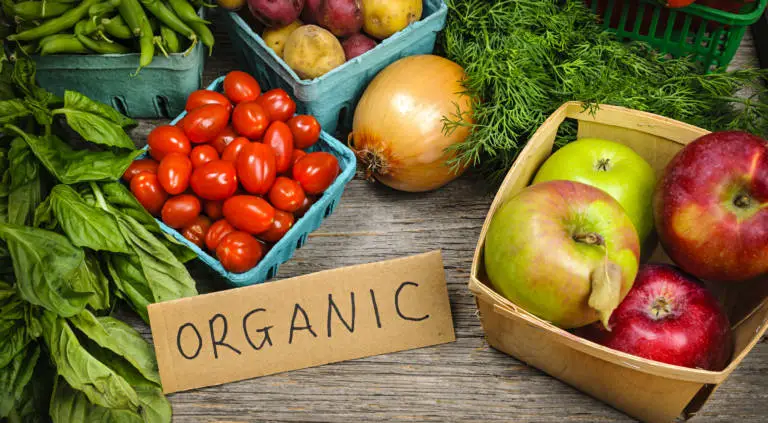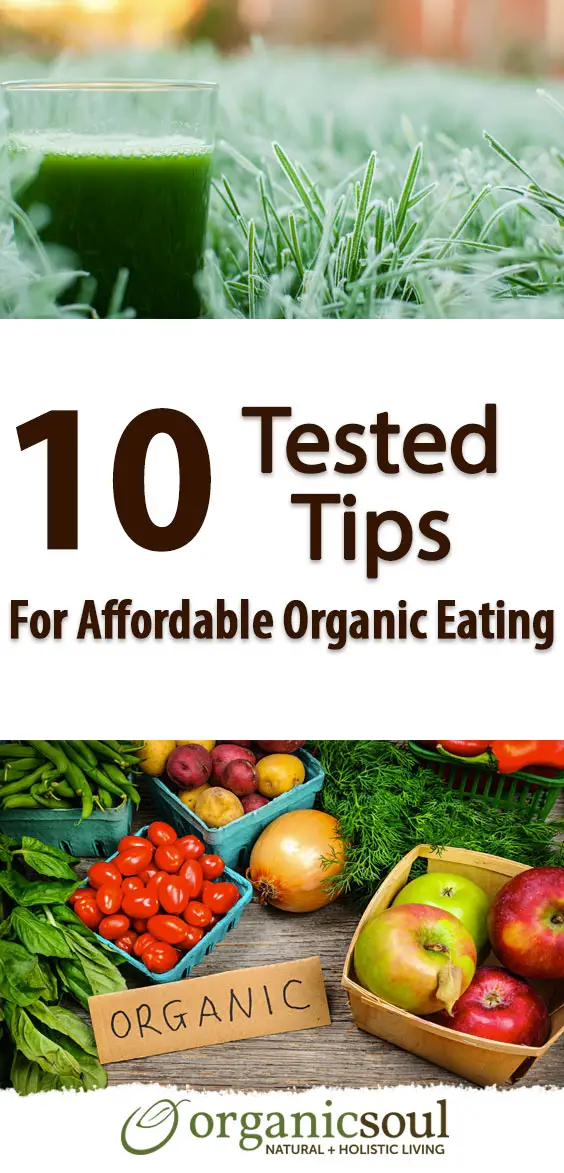
The term, “organic” essentially refers to how farmers grow and process farm products, including grains, vegetables, meat, dairy products and fruits. When something is organic, it is free of harmful pesticides, artificial additives, coloring and flavoring and preservatives, says the Mayo Clinic.
Like Organic Soul on Facebook
Organic foods are also better for the environment since its farming practices are aimed at conserving soil and water quality and reducing pollution.
With all those benefits and the better taste, many people say organic foods have, it is only natural to want to make more of your meals organic. But, as you've probably noticed, organic foods come at a higher price than their non-organic counterparts.
You can still eat organic most or all the time without breaking your food budget by using the ten tested tips for affordable organic eating!
1. Plan Your Meals
It is really easy to buy things on a whim or buy too much of one item and not enough of another if you don't have a plan before you even step inside the store. You're also more likely to end up wasting food this way, which is bad for your budget and the local landfill.
Plan your meals out at least one week in advance. Stick to the items on your meals list as closely as possible to ensure everything you buy is necessary and used before its shelf life is up. If you've never planned meals before, start out simple by assigning days for your favorite noshes.
When you get more comfortable and better at meal planning, you can do things like include new recipes to liven up and add variety to your diet.
2. Cut Back On Meat
Eating meat is generally more expensive, so if you can cut back on it, you'll save. It's both more affordable and healthier to use alternative protein sources, such as tofu, beans and lentils.
It is recommended to have rich meats like pork and red meat once or twice a week, as some studies have linked the consumption of these meats to a higher colon cancer risk.
Cutting out some meat may be difficult at first, but it truly is worth it for the health and cost benefits alone. When you do eat meat, make sure you stick to the proper portion size.
3. Pick Up In-Season Produce
It's far cheaper to buy produce when it's in season, and this is especially true for organic foods. For example, berries in the colder months will cost twice as much, so wait for them to come back in season. Since there's usually an abundance when something is in season, you may be able to snag these fruits and vegetables on sale, too.
If you're not sure when your staple produce items are in season, do a little research online to find out. You can also track price trends in the store to stay on top of the best prices for your organic fare.
4. Check Out The Bulk Section
In the bulk section, you can get the amount you need at a price that's often lower than what a package would cost. Look for items such as dried organic fruits and dried beans in the bulk section. If you don't know how to cook dried beans, you can usually find easy to follow directions on the web for free.
When you're getting things out of the bulk section, resist the urge to over-buy. Keep track of how much you've bought and how quickly you used each item so you have an idea of how much you need to buy at one time.
5. Prioritize Your Organic Needs
Naturally, you may not be able to or want to buy all organic items all the time. In this case, you can prioritize what you buy so you're getting the organic version of items that are normally the most full of pesticides and other toxins.
The items most commonly laden with toxins include apples, carrots, bell peppers, lettuce, cherries, kale and peaches.
Research what you typically buy so you know what items you need to make sure are organic before the rest of your groceries. Make a list and keep it on your phone or on paper with you so you know where you should spend extra money.
6. Back Up The Sauces And Spices
Both condiments and spices can be pretty pricey when you're buying organic, so work on cooking without relying on either. You can still make tasty meals without a lot of seasoning and sauces, especially when you're focusing on natural meals.
Experiment with different ingredients so you find the flavors you're looking for in your meals. If you're having a hard time, check out some organic cooking websites for some tips and tricks.
7. Mix And Match Across Meals
Base produce ingredients, such as peppers, onions and carrots, can be split up and used across multiple meals. Doing this will help ensure you get the most use out of what you buy and that nothing is wasted. Factor this into your meal planning, too, so your meals and your grocery list are as economical as possible.
8. Avoid Pre-Prepped Food
Pre-prepped foods are convenient but rarely organic. When they are organic, they can really add some money to your shopping bill. The more work you put into your food, the less you'll spend and the healthier it will be, so leave those pre-prepped foods on the shelf for now.
9. Use More Coupons
Coupons are a great way to save on your groceries, and the money adds up over time. Check out organic food websites, as some feature coupons you can use at your local grocery store. Also take a look at local flyers and ads for savings to clip out.
 If you've not really used coupons too often before, you may have to get yourself into the habit. Create a system so you can keep track of the coupons you have, what product or food categories they are for and when they expire.
If you've not really used coupons too often before, you may have to get yourself into the habit. Create a system so you can keep track of the coupons you have, what product or food categories they are for and when they expire.
There are coupon organizers, but a shoe box with index cards as separators also works. Mobile coupons are getting more popular now, too, so look for coupon and store apps to turn your phone into a walking money saver.
10. Look For Sales
Sales can help you stretch your budget even further, and you can sometimes pair sales with coupons for an even better discount. You can also use sales flyers to help inspire your meal planning if you're stuck. If you find something on sale that sounds good, go for it! You may just create one of your new favorite meals.
Eating organic doesn't have to put a huge dent in your budget if you play your cards right. Use the tips above, and get creative in the kitchen to start eating healthier, more natural meals!













